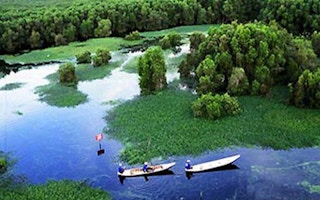Local communities provide the best hope of protecting Vietnam’s forests, but they need the right tools. That’s the message of a new film released last week by the NGO International Institute for Environment and Development (IIED).
The villagers of Pho Trach are highly motivated to protect the sandy forest they depend on for food and fuel. The forest is an integral part of their lifestyle – they use it to feed their livestock and protect their reservoir for irrigation of their rice crops. In the rainy season, they retreat to the forest when the village floods.
As a significant part of their ancestral heritage, the forest has been managed by the community for more than 400 years. The government has recognised their management cooperative since the 1970’s, but so far the village has no legal proof of their rights to the land.
Villagers such as Phan Ba The, chairman of the Pho Trach Co-operative, do what they can to protect the forest. The community organises regular patrols to stop encroachers trying to illegally exploit the land, but community leaders said that without official proof of land rights their power to stop deforestation is limited.
Mr Phan said that the community’s future depends on their ability to preserve the forest. “If the sandy forest still exists, then we still exist, both physically and spiritually. But if the sandy forest is lost, then we also will be lost,” he said.
In the film, villagers described an incident that demonstrated their vulnerability as unofficial forest managers. In 2004, the government reclaimed some of their land and gave permission to a sand mining company to extract sand. The villagers, who received a small monetary compensation, were unhappy about losing the land but had no choice but to let the company exploit their land.
The key to survival, according to the villagers, is a red book.
Red books are given to forestry communities under an experimental project undertaken by the Vietnamese to empower local communities to manage their local resources. The book provides guidelines on forest management in addition to official recognition of the community’s legal right to manage the land.
Thon Bon is one village that has received a red book under the government scheme. The community has held legal title to 60 hectares of forest since 2005. While they have no right to transfer the land or grant land use concessions, they can use the forest for their traditional livelihoods in return for providing protection and sustainable management.
Tran Huu Banh, who is a former director of the district’s forestry department, said that Thon Bon has improved forestry practices by combining their traditional knowledge with government guidelines. “Villagers have a greater awareness of the importance of protecting the forest because they understand its many uses, not only economic but also ecological,” he added.
But even with the red book, more support is needed said Mr Tran: “There is a lack of support from international donors or investment by the state.”
Dr Nguyen Quang Tan, who works on the IIED project in Vietnam, said that the rights of local people managing forests will play an increasingly important role in the nation’s forestry policies, especially in light of carbon financing mechanisms.
“There will be a big financial incentive to support forest development. But if local people have no legal right to the forest then they’ll be at a great disadvantage in trying to get any benefits,” he said.
Produced in conjunction with the International Year of the Forests, “Justice in the Forests: Vietnam” is one of a series of six films that examines the importance of empowering local communities to protect the world’s forests.
Villages such as Pho Trach with a long history of good forest management provide services that benefit the whole country. They protect against the loss of biodiversity, contribute to watershed protection and help reduce carbon emissions from deforestation.
But there’s no guarantee they’ll be able to continue.
IIED’s Dr Nguyen said more can be done to support forestry communities in their roles as forest managers: “In order to ensure that local people are motivated to manage their forest and that they get income from it…it will be very important to allocate forest to the community and give them legal rights so they feel more secure.”










